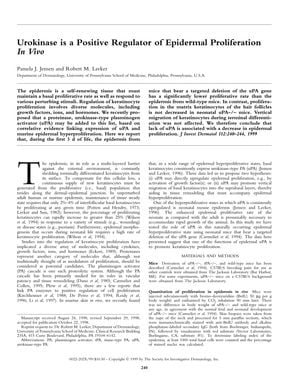Urokinase Is a Positive Regulator of Epidermal Proliferation In Vivo
February 1999
in “
Journal of Investigative Dermatology
”

TLDR Urokinase, a type of protein, helps skin cells multiply faster, especially in newborn mice.
In 1999, researchers Pamela J. Jensen and Robert M. Lavker from the University of Pennsylvania School of Medicine conducted a study on the role of urokinase-type plasminogen activator (uPA) in epidermal proliferation. They found that neonatal mice lacking the uPA gene had a significantly lower rate of epidermal proliferation in the first 3 days of life compared to normal mice. However, the proliferation of matrix keratinocytes in the hair follicles was not affected in these uPA-deficient mice. By day 5, the proliferation rate normalized and then gradually declined, similar to normal mice. The researchers hypothesized that uPA could stimulate the uPA receptor or cleave hepatocyte growth factor, a mitogen for keratinocytes, but the exact mechanism remained unclear. The study concluded that uPA may play a role in promoting keratinocyte proliferation and that the plasminogen activator system may have physiological roles beyond fibrinolysis.
